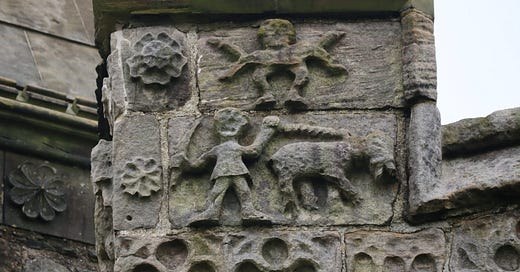My caravan creaked in the rising wind. Brambles smudged their fruit on the plastic walls, and it seemed like a storm was coming. But later when I woke in the darkness, the world had fallen deafeningly still. Fog had come to seamost point of Anglesey, and as ferries came and departed for Dublin, a foghorn warned them to keep away from the stacks.
I like to think of foghorns blaring their blunderbuss-mouths, swelling words like “beLOOOga” or “harROOO” to the sea, but above Holyhead the horning comes from a tall building shaped like a cheese grater on the cliffs. The warning itself is a digital chime; banks of claxons rung together like a tuning fork so the sound itself is less than a vowel. It’s a uniform, synthetic sound, but the texture of each blast varies according to the depth and quality of the fog at that moment. So while some come softly, wandering gently between the gulls, others rush upon you like a gale. If only they’d make up their minds, because you can sleep through consistency, and this endless variety is pure disturbance. At five o’clock, I climbed out of my bed-shaped cabinet and made coffee on a gas burner. Peering out beneath the net curtain of a small window, I could see fog shoaling in the glow of the light as the shipping forecast played, leading me to think more on “Irish Sea” than ever before.
Much later, I ate my breakfast at a caff in Holyhead. I had eggs, bacon, sausages and beans. Everything tasted the same, and afterwards, I walked down around the harbour where the ships were lit by haloes of their own hard work. Pools of diesel swirled in the water, kissing the bald forehead of a dead jellyfish. Pausing nearby for a moment, a man in a dayglo jacket interrupted a call he was making on his telephone in order to clean out his lungs. He hacked and sniffed, then he scooted phlegm onto the cobbles like guano. Then he started talking again.
Holyhead’s a fine place for its filth and residues. You don’t need to be told that for several hundred years, this was the main route from Dublin to London - you can see it in the soreness of the roads. Paving slabs sag, and the street corners are scuffed with grease from acres of hair and thousands of hands and the endless wipe of axle hubs. Having been drawn through the Ogwen Valley and the terror of Tryfan, English travellers finally stepped down from their carriages in Holyhead at “The Eagle and Child” Inn, where a bleak sign showed a baby being carried away to its fate. If local mythologies tend towards darkness, here’s a fine way to enter and leave Wales; a gateway that feels all the more grubby and gothic since other modes of transport reduced this place to a plain functionality. There are more comfortable ways for you and I to find Ireland now. This is a place for heavy lorries and commercial traffic.
Curled above the harbour’s lip, the old church to St Cybi glowers in a mess of roman walls and medieval stone carvings. Some of these show dragons and angels, and there’s a man hauling his cow by a rope. Treasures like these are normally amplified against ascetic settings of simple rurality; single trees or a distant ramp of hills. That’s the famous Cambrian aesthetic, but the crumbling, downcast aspect of Holyhead heightens the impact of St Cybi’s church in many of the same ways. Fleeing from affluence or celebrity nowadays, it’s unlikely that Dark Age saints would choose to set up shop amongst comfortable rural communities dominated by middle class second home-owners. They’d come to be alone where they are needed, in places like Holyhead.
A light breeze rattled bags of flowers attached to the church gates. There was a note attached to one of these which read “thank you for your service”. I think it was for the Queen, but maybe the Priest had recently outdone himself with something special. Out of sight beyond the buildings, somebody shouted “You won’t touch it” over and over again, rising each time as if in growing disbelief. Somebody else laughed back in Welsh, then the fog turned to rain and I loved it all.
Later still and out on the stacks, I found a gap in the fog and stared vertically down upon seals which boiled in the low green water. A mile offshore, a commercial ferry slipped between veils of rain, and perhaps I imagined seeing it poled into the mist by a tall, forboding skeleton with coins where his eyes might’ve been. Choughs called invisibly overhead, and this is meant to be a place for birds. It’s an RSPB reserve, and birders come here to look for interesting things which are squeezed out of Wales by the convergence of two coastlines. But there was nothing for me to see in the mist of early September, and only the same sound of the horn which had rung from four o’clock without interruption, never knowing that by telling things to stay away, it had itself become an attraction.
First published on Bog Myrtle & Peat - September 2022




